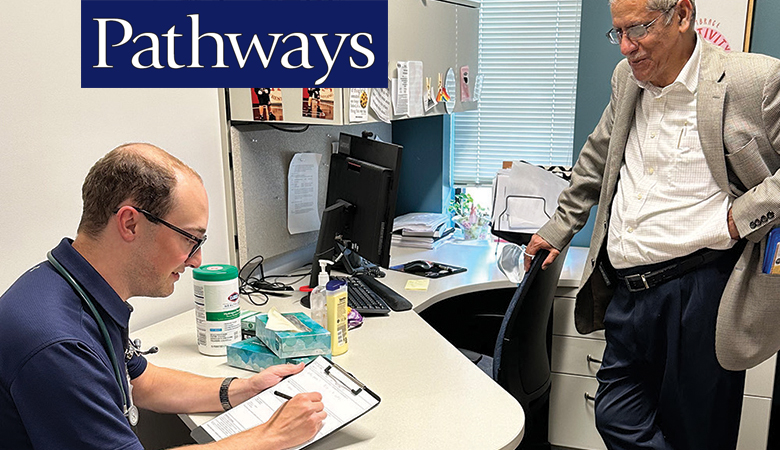Pathways: Córdoba Clinic Immerses Students in Community Health

While Córdoba Clinic offers free healthcare to Peoria-area patients, the clinic also provides valuable experiences for UICOMP medical students to learn and serve on their journeys to becoming doctors.
Katherine Floess (UICOMP Class of 2023) is a member of the student leadership team for Córdoba and started volunteering at the clinic her first year in medical school. While Floess has always been interested in community health and working with underserved patients, she says her work at Córdoba has also benefited her by giving her clinical experience and more interaction with fellow medical students.
“M1 and M2 years can be very strenuous as you spend all day studying and watching videos and doing flash cards,” she says. “Córdoba has always grounded me and reminded me why I wanted to go to medical school in the first place. Even during my clinical years when the clinical setting was no longer novel, volunteering at Córdoba has helped me during the times I felt exhausted and burned out by reminding me of the kinds of work I want to do as a physician and why I chose this career path.”
Floess says immigrants comprise much of the patient population at Córdoba, and this often calls for bridging a gap between health care in their home country and here. She shared that a recent patient was diagnosed with diabetes in his home country where he had been given two medications. He came to Córdoba for his first visit when the Córdoba team discovered one of the medications carried high risks for complications and was not recommended. “We had to address this, look into access to an alternative agent that he and his family could afford, and figure out dosage and follow-up,” she says. “This was an example of the ways in which working with patients from different backgrounds can be fascinating and challenging. You’re thinking about different risk factors, differentials, and access to medications and medical care.”
“Córdoba is unique because of the level at which students are allowed to participate in all aspects of care… it is also truly unique because it is a subspecialty clinic,” Floess adds. “Rarely do patients who have little or no health insurance have access to subspecialists, and this makes the physicians who volunteer at Córdoba truly amazing for recognizing that underlying health need.”
Floess recalls a particularly busy Sunday when a UICOMP student leader at the clinic asked her, then an M1, “We have a patient here who’s in for blood pressure follow up. Would you feel comfortable seeing them on your own?” Up until that point, she had always shadowed upper-classmen who would talk her through the process of seeing patients. She says, “I remember being terrified but saying, ‘Yes, absolutely, but if I have questions, I’ll come to you.’ Honestly, having that confidence to say ‘yes’ translated well to my experiences in clinical rotations.”
During his volunteer time at Cordoba Clinic, Matthew Grammer (UICOMP Class of 2024) presents his patient to Mohammad Zafar, MD, after taking a history and physical. (Photo by Justin Porter)
Justin Porter (UICOMP Class of 2024) has seen patients with physicians of many different specialties in the two years he has volunteered with Córdoba. Like other students, his role and responsibilities have evolved with time, including performing a quality improvement project aimed at increasing patient and student numbers in the clinic, leading an effort to increase community awareness of Córdoba’s services by distributing pamphlets locally, and helping the clinic get a reliable EKG machine.
Porter says volunteering his limited free time at Córdoba is a no-brainer. “Being involved in patient care for a population that needs care but cannot afford it is a privilege,” he says. “During the first two years of medical school, medical students spend most of our time in a classroom setting, so this was a way for me to take the information I was learning and apply it so I can help patients in a controlled environment. At times, volunteering at Córdoba gave me perspective in my studies. When I had been studying for several hours and knew I had to study for several more, it was easy to lose motivation, but working with these patients reminded me of why I am doing all of this work.”
Porter says one of his favorite lessons learned is that preventative care is more important than most people realize.
“Discussing health outcomes with patients early on can save them a whole lot of trouble,” he says. “Volunteering at Córdoba has allowed me to apply concepts that I have learned in the classroom to real life patients and has reinforced a lot of information. Because of volunteering at Córdoba Clinic, I was able to start clerkships running because I was already comfortable talking with patients, writing notes, and presenting patients to attendings.”
His experience at Córdoba makes him more mindful of medically underserved patients and has raised his awareness of community resources that will help him better serve a vulnerable population wherever he ends up practicing medicine.
Rahmat Na’Allah, MD, professor of clinical family medicine, is a professional provider at Córdoba Clinic who says caring for patients at Córdoba is an honor. “It is a privilege to care for those who otherwise do not have access to the barest minimum care and to do this alongside other specialists and staff who completely volunteer their time on a weekend,” she says. “Even more gratifying is the honor of teaching the next generation of physicians the value of serving their community, reducing health disparity, humanism and advocacy.”
Córdoba Clinic Medical Director Amanullah Jamaluddin, MD, credits UICOMP medical students with prioritizing patient care. “All medical students frequently stay well beyond the 4 pm closing time if there are still patients to be seen and cared for. They are not looking at their watches, but are looking out for patient care,” he says.
This article is part of the Fall 2022 edition of Pathways. Read the full issue.